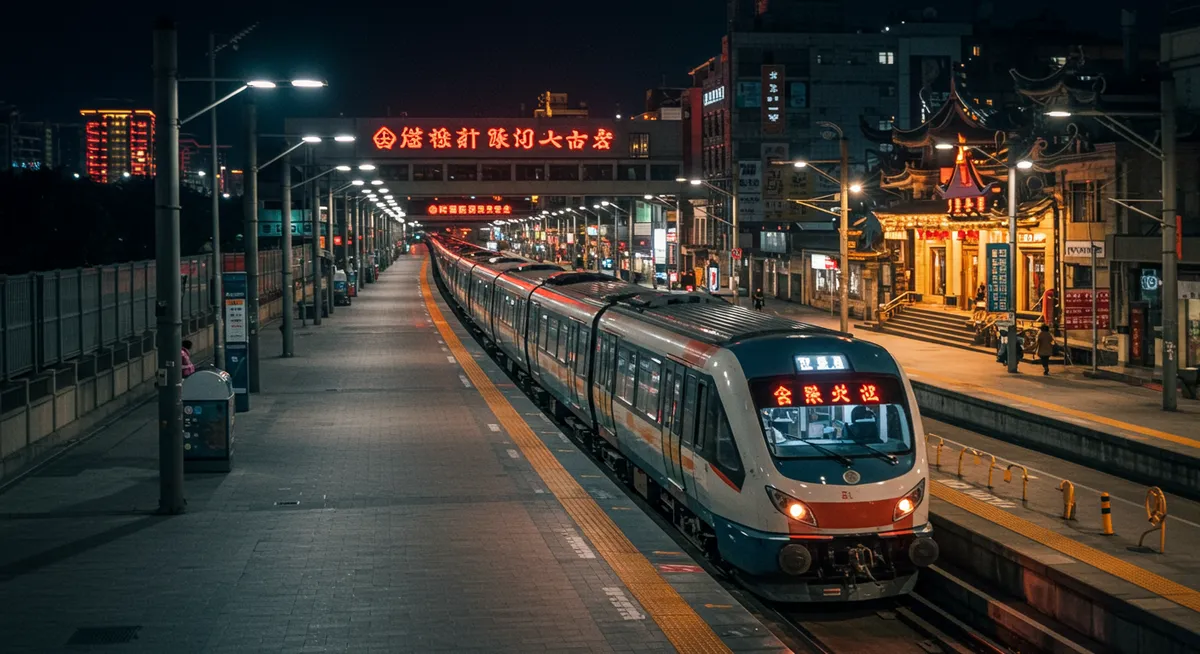Qingdao's comprehensive railway network connects the coastal city to major destinations throughout China via multiple modern train stations that serve different routes and rail types. Understanding these stations, their services, and connections enables seamless travel whether arriving from other Chinese cities, planning regional day trips, or continuing your journey to other destinations. From high-speed rail terminals serving Beijing and Shanghai to local stations connecting coastal towns, this guide ensures you navigate China's extensive rail system with confidence while maximizing your Qingdao exploration and efficiently accessing top attractions and beautiful beaches.

Qingdao Railway Overview: Gateway to China
Qingdao's strategic railway position connects the city to China's national high-speed rail network while maintaining extensive regional and local connections that enable efficient travel throughout the Shandong Peninsula and beyond. The modern railway infrastructure combines cutting-edge high-speed technology with traditional rail services, creating comprehensive transportation options for every journey type and budget. Get deeper into best via Best Time To Visit.
The city's multiple train stations serve different purposes and destinations, from international connectivity through Beijing and Shanghai routes to regional services connecting nearby coastal cities and cultural destinations. Understanding these distinctions enables optimal station selection and journey planning that aligns with your specific travel needs and destinations.
China's railway system represents one of the world's most extensive and efficient transportation networks, with Qingdao serving as a major hub that showcases the system's capabilities while providing excellent access to both urban attractions and regional exploration opportunities.
Major Train Stations in Qingdao
Qingdao North Railway Station (青岛北站)
Primary High-Speed Rail Hub
Qingdao North Station serves as the city's primary high-speed rail terminal, handling the majority of bullet train services and long-distance connections to major Chinese cities. This modern facility opened in 2014 and represents China's latest railway terminal design and technology.
Key Information:
- Location: Chengyang District, northern Qingdao
- Primary Services: High-speed rail (CRH and CRH380 series)
- Major Routes: Beijing, Shanghai, Jinan, Tianjin, Hangzhou
- Platforms: 8 platforms with 18 tracks
- Daily Trains: 100+ high-speed departures
- Opening Hours: 24 hours with limited late-night services
Facilities and Services:
- Waiting Areas: Large, air-conditioned waiting halls with comfortable seating
- Dining Options: Restaurants, cafes, and convenience stores
- Shopping: Retail stores and local specialty shops
- Business Services: VIP lounges, internet access, and charging stations
- Accessibility: Wheelchair access, elevators, and assistance services
- Luggage Services: Storage facilities and porter services
Transportation Connections:
- Metro Line 3: Direct connection to central Qingdao
- Bus Routes: Multiple city bus lines and express services
- Taxi Services: Dedicated taxi queue with regulated pricing
- Airport Shuttle: Direct connections to Qingdao Airport
- Car Rental: Major rental agencies with on-site services
Qingdao Railway Station (青岛站)
Historic Central Terminal
The original Qingdao Railway Station, built during the German colonial period and renovated multiple times, serves as the city's central rail terminal with convenient access to downtown attractions and accommodation.
Key Information:
- Location: Shinan District, central Qingdao
- Primary Services: Conventional trains, some high-speed services
- Major Routes: Regional connections, overnight trains, freight services
- Historical Significance: Original 1901 station with architectural heritage
- Central Location: Walking distance to major attractions
- Daily Operations: Continuous service with varying frequency
Advantages of Central Location:
- Walking Distance: 10-15 minutes to Zhanqiao Pier
- Attraction Access: Close to Badaguan and central sights
- Accommodation: Numerous hotels within walking distance
- Dining Options: Restaurant district and local cuisine
- Shopping Areas: Zhongshan Road commercial district nearby
Station Facilities:
- Waiting Areas: Traditional waiting halls with basic amenities
- Food Services: Local restaurants and snack vendors
- Ticket Office: Full-service booking and information
- Storage: Luggage storage and left baggage services
- Transportation Hub: Bus stops and taxi stands
Qingdao West Railway Station (青岛西站)
Emerging Regional Hub
Qingdao West Station represents the newest addition to the city's railway infrastructure, designed to handle growing passenger volume and provide additional high-speed rail capacity.
Key Information:
- Location: Western districts, expanding urban area
- Services: High-speed rail and regional connections
- Development Status: Recently opened with ongoing expansion
- Future Growth: Planned capacity increases and route additions
- Modern Design: Latest railway terminal technology and facilities
High-Speed Rail Connections
Major High-Speed Routes from Qingdao
Beijing-Shanghai High-Speed Railway:
- Route: Qingdao ↔ Jinan ↔ Beijing (northbound) / Shanghai (southbound)
- Travel Times: Beijing 4.5-5.5 hours, Shanghai 4-5 hours
- Frequency: Multiple daily departures every 30-60 minutes
- Train Types: G-series (350 km/h) and D-series (250 km/h) trains
- Major Stops: Jinan West, Tianjin South, Beijing South, Nanjing South
Jinan-Qingdao High-Speed Railway:
- Route: Direct connection to Shandong provincial capital
- Travel Time: 2.5-3 hours to Jinan
- Frequency: High frequency with departures every 20-30 minutes
- Regional Access: Connections to provincial destinations
- Cost Efficiency: Competitive pricing for regional travel
Coastal High-Speed Connections:
- Yantai Route: 2.5-3 hours via high-speed rail
- Weihai Connection: 3-3.5 hours with transfers
- Regional Network: Access to Shandong Peninsula destinations
- Day Trip Potential: Same-day return possibilities for nearby cities
Booking High-Speed Rail Tickets
Online Booking Platforms:
- 12306.cn: Official China Railway booking platform
- Third-Party Apps: Trip.com, Ctrip, and other travel platforms
- English Support: Some platforms offer English-language interfaces
- Payment Methods: International credit cards accepted on some platforms
- Mobile Tickets: Digital tickets available for most services
Station Booking:
- Ticket Windows: Full-service booking at all major stations
- Self-Service Machines: Automated ticket purchasing with multi-language support
- Advance Booking: Tickets available 30 days in advance
- Peak Period Planning: Book early for holidays and festivals Discover more Qingdao qingdao ideas in Qingdao planning guide.
- ID Requirements: Passport required for international travelers
Regional and Local Rail Services
🎯 Insider Tip: Discover the best Railway experiences with Viator Tours!
Conventional Rail Network
Traditional Train Services:
- K-Series Trains: Fast trains connecting major cities
- T-Series Trains: Express services with fewer stops
- Z-Series Trains: Direct express trains for long distances
- Local Trains: Regional services connecting smaller towns
- Overnight Services: Sleeper trains for distant destinations
Regional Destinations:
- Shandong Province: Comprehensive coverage of provincial cities
- Coastal Towns: Direct services to smaller coastal destinations
- Mountain Areas: Access to Tai'an (Mount Tai) and cultural sites
- Rural Connections: Traditional rail serving countryside areas
Suburban and Commuter Services
Local Commuter Network:
- Urban Rail: Services connecting city districts
- Suburban Lines: Daily commuter services to outlying areas
- Integration: Connections with metro and bus systems
- Frequency: Regular schedule for daily transportation needs
Station Navigation and Facilities
🎯 Insider Tip: Discover the best Railway experiences with Viator Tours!
General Station Layout
Typical Chinese Railway Station Design:
- Entrance Level: Ticket hall, information, and security screening
- Waiting Level: Departure lounges organized by train categories
- Platform Level: Train platforms with numbered access points
- Underground/Overpass: Connections between platforms and exits
- Transportation Hub: Ground level with bus, taxi, and metro connections
Signage and Navigation:
- Bilingual Signs: Chinese and English signage throughout major stations
- Platform Numbers: Clear platform identification and train information
- Digital Displays: Real-time departure and arrival information
- Audio Announcements: Multilingual announcements for major trains
- Information Desks: Staffed help desks with multilingual support
Essential Station Services
Passenger Services:
- Ticketing: Multiple options for ticket purchase and collection
- Security Screening: Mandatory baggage and personal screening
- Waiting Areas: Climate-controlled spaces with seating
- Restrooms: Clean facilities throughout station areas
- Information Services: Travel assistance and local guidance
Commercial Services:
- Dining Options: Restaurants, cafes, and convenience stores
- Shopping: Retail stores, souvenirs, and travel necessities
- Banking: ATMs and currency exchange services
- Communication: WiFi access and phone charging stations
- Luggage Services: Storage, wrapping, and porter assistance
Transportation Connections
Metro and Public Transit Integration
Qingdao North Station Connections:
- Metro Line 3: Direct connection to city center and coastal areas
- Journey Times: 45-60 minutes to central attractions
- Transfer Points: Connections to other metro lines at key stations
- Frequency: Trains every 5-10 minutes during peak hours
- Cost: ¥3-6 depending on destination
Central Station (Qingdao Station) Access:
- Walking Distance: Central location within walking distance of major sites
- Bus Connections: Multiple bus routes serving all city areas
- Taxi Access: Convenient taxi stands with regulated pricing
- Metro Proximity: Short bus ride or walk to metro stations
For comprehensive transportation planning from train stations, consult our detailed Qingdao transport guide.
Airport and Long-Distance Connections
Airport Transfer Options:
- Direct Shuttle: Airport express buses from major stations
- Metro Connections: Connecting services to airport metro line
- Taxi Services: Direct taxi services with fixed pricing options
- Private Transfers: Hotel and tour operator shuttle services
For comprehensive airport connections, explore our detailed airport transport guide.
Practical Travel Tips
Ticket Purchasing and Validation
Advance Planning:
- Booking Timeline: Purchase tickets 15-30 days in advance for better availability
- Peak Periods: Chinese holidays require earlier booking and higher prices
- Seat Selection: Window vs. aisle preferences available during booking
- Ticket Types: First class, second class, and business class options
- Flexible Tickets: Some tickets allow date changes with fees
Day of Travel:
- Arrival Time: Arrive 30-60 minutes before departure for security and boarding
- ID Requirements: Passport required for ticket collection and boarding
- Security Screening: Allow time for baggage and personal screening
- Platform Access: Boarding begins 5-15 minutes before departure
- Punctuality: Chinese trains depart exactly on time
Language and Communication
Essential Phrases:
- Train Station: 火车站 (huǒchē zhàn)
- High-Speed Rail: 高铁 (gāotiě)
- Platform: 站台 (zhàntái)
- Ticket: 车票 (chēpiào)
- Departure Time: 发车时间 (fāchē shíjiān)
- Arrival Time: 到达时间 (dàodá shíjiān)
Translation Tools:
- Mobile Apps: Google Translate with camera function for signs
- Offline Translation: Download Chinese language packs before travel
- Station Assistance: Information desks with English-speaking staff
- Written Communication: Have destination written in Chinese characters
Luggage and Security Considerations
Baggage Policies and Restrictions
Allowed Items:
- Personal Luggage: Reasonable amounts of personal belongings
- Electronics: Laptops, phones, and standard electronic devices
- Food Items: Packaged food and non-alcoholic beverages
- Clothing: Personal clothing and travel necessities
Prohibited Items:
- Weapons: Any weapons, including knives and tools
- Flammable Items: Lighters, matches, and flammable liquids
- Explosives: Fireworks, chemicals, and explosive materials
- Liquid Restrictions: Large quantities of liquids may be restricted
Security Procedures
Standard Security Process:
- Bag Screening: X-ray scanning of all luggage
- Personal Screening: Metal detector screening for passengers
- ID Verification: Passport check and ticket validation
- Random Checks: Additional screening may be conducted
- Cooperation Required: Patient cooperation with security personnel
Special Services and Accessibility
🎯 Insider Tip: Discover the best Railway experiences with Viator Tours!
Accessibility Features
Physical Accessibility:
- Wheelchair Access: Ramps and elevators throughout major stations
- Assistance Services: Staff assistance for passengers with disabilities
- Special Seating: Designated wheelchair spaces on trains
- Accessible Restrooms: Specially designed facilities
- Audio Assistance: Audio announcements and tactile guidance
Family Services:
- Family Waiting Areas: Special areas for families with children
- Baby Care: Nursing rooms and diaper changing facilities
- Stroller Access: Accommodation for strollers and child equipment
- Children's Tickets: Discounted fares for children
VIP and Business Services
Premium Services:
- VIP Lounges: Exclusive waiting areas with enhanced comfort
- Business Class Travel: Premium seating and service on trains
- Priority Boarding: Expedited boarding for premium passengers
- Concierge Services: Travel assistance and local recommendations
Seasonal Considerations and Peak Travel
Peak Travel Periods
Chinese New Year (January-February):
- Highest Demand: Busiest travel period with limited availability
- Advance Booking: Book 30 days in advance essential
- Higher Prices: Premium pricing during holiday period
- Crowd Management: Expect larger crowds and longer wait times
Golden Week Holidays:
- National Day (October): High domestic travel volume
- Labor Day (May): Increased regional travel
- Summer Holidays: Peak family travel season
- Planning Required: Advance booking and flexible scheduling recommended
Weather Considerations
Seasonal Impacts:
- Summer Storms: Potential delays during severe weather
- Winter Conditions: Snow and ice may affect schedules
- Spring Travel: Optimal weather for comfortable travel
- Autumn Benefits: Pleasant conditions and moderate demand
Combining Train Travel with Qingdao Exploration
Arrival Integration
Seamless Transition:
- Direct Hotel Transfer: Efficient transport from stations to accommodation
- Attraction Access: Immediate access to city attractions
- Luggage Solutions: Hotel delivery and storage services
- Orientation Services: Tourist information and city guidance
Day Trip Planning:
- Regional Exploration: Using rail for nearby destinations
- Cultural Sites: Train access to Mount Tai, Qufu, and heritage sites
- Coastal Cities: Rail connections to Yantai, Weihai, and other coastal destinations
- Return Convenience: Same-day return to Qingdao accommodation
Multi-City Itineraries
Train travel enables comprehensive exploration beyond Qingdao while using the city as a comfortable base for regional adventures.
Extended Exploration Options:
- Beijing-Qingdao-Shanghai Circuit: Major city connections via high-speed rail
- Shandong Peninsula Tour: Regional exploration using Qingdao as hub
- Cultural Heritage Route: Connecting Confucian sites and sacred mountains
- Coastal Discovery: Multiple coastal cities accessible by rail
Qingdao's excellent railway connections provide seamless access to the city's coastal charm while enabling efficient exploration of China's vast cultural and natural heritage. Whether arriving from major cities or planning regional adventures, understanding the railway system enhances every aspect of your travel experience while ensuring smooth, comfortable journeys throughout your Chinese adventure.
Plan your rail travel as part of a comprehensive Qingdao exploration using our detailed travel guide, and discover how China's exceptional railway system opens unlimited possibilities for cultural discovery and regional exploration centered around this remarkable coastal destination.



